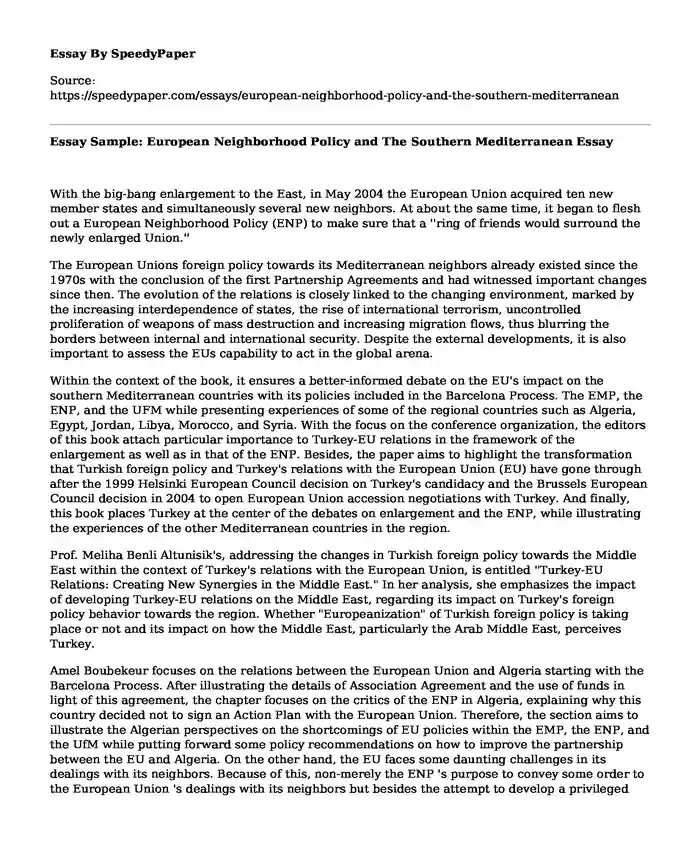
| Type of paper: | Book review |
| Categories: | Europe Foreign policy |
| Pages: | 3 |
| Wordcount: | 808 words |
With the big-bang enlargement to the East, in May 2004 the European Union acquired ten new member states and simultaneously several new neighbors. At about the same time, it began to flesh out a European Neighborhood Policy (ENP) to make sure that a ''ring of friends would surround the newly enlarged Union.''
The European Unions foreign policy towards its Mediterranean neighbors already existed since the 1970s with the conclusion of the first Partnership Agreements and had witnessed important changes since then. The evolution of the relations is closely linked to the changing environment, marked by the increasing interdependence of states, the rise of international terrorism, uncontrolled proliferation of weapons of mass destruction and increasing migration flows, thus blurring the borders between internal and international security. Despite the external developments, it is also important to assess the EUs capability to act in the global arena.
Within the context of the book, it ensures a better-informed debate on the EU's impact on the southern Mediterranean countries with its policies included in the Barcelona Process. The EMP, the ENP, and the UFM while presenting experiences of some of the regional countries such as Algeria, Egypt, Jordan, Libya, Morocco, and Syria. With the focus on the conference organization, the editors of this book attach particular importance to Turkey-EU relations in the framework of the enlargement as well as in that of the ENP. Besides, the paper aims to highlight the transformation that Turkish foreign policy and Turkey's relations with the European Union (EU) have gone through after the 1999 Helsinki European Council decision on Turkey's candidacy and the Brussels European Council decision in 2004 to open European Union accession negotiations with Turkey. And finally, this book places Turkey at the center of the debates on enlargement and the ENP, while illustrating the experiences of the other Mediterranean countries in the region.
Prof. Meliha Benli Altunisik's, addressing the changes in Turkish foreign policy towards the Middle East within the context of Turkey's relations with the European Union, is entitled "Turkey-EU Relations: Creating New Synergies in the Middle East." In her analysis, she emphasizes the impact of developing Turkey-EU relations on the Middle East, regarding its impact on Turkey's foreign policy behavior towards the region. Whether "Europeanization" of Turkish foreign policy is taking place or not and its impact on how the Middle East, particularly the Arab Middle East, perceives Turkey.
Amel Boubekeur focuses on the relations between the European Union and Algeria starting with the Barcelona Process. After illustrating the details of Association Agreement and the use of funds in light of this agreement, the chapter focuses on the critics of the ENP in Algeria, explaining why this country decided not to sign an Action Plan with the European Union. Therefore, the section aims to illustrate the Algerian perspectives on the shortcomings of EU policies within the EMP, the ENP, and the UfM while putting forward some policy recommendations on how to improve the partnership between the EU and Algeria. On the other hand, the EU faces some daunting challenges in its dealings with its neighbors. Because of this, non-merely the ENP 's purpose to convey some order to the European Union 's dealings with its neighbors but besides the attempt to develop a privileged and shared relationship between them, are presented in a great extent. So, does the ENP indeed supply the suited construction for covering with the main challenges?
Ahmed Ghoneim focuses on the changes in EU's regional trade policy, arguing that the changes made to initiate the European Neighbourhood Policy in 2003 and the Union for the Mediterranean in 2008 are creating a lot of confusion for countries in the South Mediterranean, with particular emphasis on Egypt. This chapter focusing on Egypt, emphasizes concerns regarding the institutional setup of the European Neighborhood Policy, Action Plans, and the newly born Union for the Mediterranean. For an informed argument on the capability of the EU and its influence as a global actor, it is important to link it to both exogenous and endogenous determinants, i.e., external and internal pressures. Endogenous determinants refer to the capacity concerning material and nonmaterial factors, namely the institutional set-up and the toolbox depending on the strategical and normative objectives for external action
No one would disagree that one way for the EU to enforce its struggles for achieving the goals mentioned above, is through the ENP. It is an ambitious policy, which has the potential to make an enormous difference to the prosperity and stability of both the EU and its neighbors. So, the EU has to strengthen the ENP to provide concrete and credible incentives for reform. Hence, a strong ENP has to be set out. The vision contained in the ENP - the real and mutual relation of EU to its nearest friends and vice versa - should be a reality for the stability and wealth of both.
Cite this page
Essay Sample: European Neighborhood Policy and The Southern Mediterranean. (2022, Mar 28). Retrieved from https://speedypaper.net/essays/european-neighborhood-policy-and-the-southern-mediterranean
Request Removal
If you are the original author of this essay and no longer wish to have it published on the SpeedyPaper website, please click below to request its removal:
- Race in the 21st Century. Free Essay Example.
- Essay for You to Check: Effects of Biomedical and Bioinformatics in Nursing
- Liquid Biopsy for Cancer, Free Essay in Medicine
- Terrorists Behavioral Analysis, Essay Sample
- Trump Is Either Intelligent or Popular, Free Essay Sample
- Free Essay Sample on a Multicultural Society
- Of Mice and Men: American Dreams. Free Essay Sample
Popular categories




